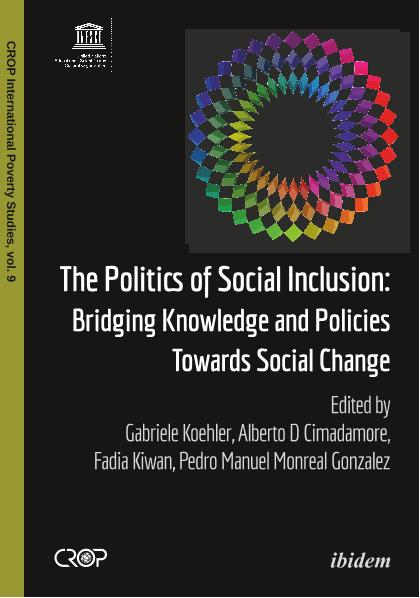Capítulo de Libro
The politics of social inclusion: Introduction
Título del libro: The politics of social inclusion: Bridging knowledge and policies towards social change
Koehler, Gabriele; Cimadamore, Alberto Daniel ; Kiwan, Fadia; Monreal Gonzalez, Pedro
; Kiwan, Fadia; Monreal Gonzalez, Pedro
 ; Kiwan, Fadia; Monreal Gonzalez, Pedro
; Kiwan, Fadia; Monreal Gonzalez, Pedro
Otros responsables:
Koehler, Gabriele; Cimadamore, Alberto Daniel ; Kiwan, Fadia; Monreal Gonzalez, Pedro Manuel
; Kiwan, Fadia; Monreal Gonzalez, Pedro Manuel
 ; Kiwan, Fadia; Monreal Gonzalez, Pedro Manuel
; Kiwan, Fadia; Monreal Gonzalez, Pedro Manuel
Fecha de publicación:
2020
Editorial:
Ibidem Press; Comparative Research Programme on Poverty; United Nations Educational, Scientific and Cultural Organization
ISBN:
978-3-8382-1333-0
Idioma:
Inglés
Clasificación temática:
Resumen
Academics, policy-makers, civil society and concerned citizens across the planet are alarmed by the persistence of global poverty, the intensity of social exclusion and increasing inequalities. Multidimensional poverty continues to affect half of humanity. Inequality has reached unprecedented levels: according to Oxfam’s analysis, for example, in 2018, 26 people owned the same wealth as the 3.8 billion people who make up the poorest half of humanity (Oxfam, 2019; also see Piketty, 2014; UNRISD, 2018). Climate change impact and armed conflicts are wiping out many human development achievements of the past decades, frequently exacerbating existing patterns of social exclusion. To redress the dystopian situation, the international community adopted the 2030 Agenda for Sustainable Development – Transforming our World (United Nations, 2015), the Paris Agreement on Climate Change (UNFCCC, 2015), and designed a new urban agenda (UN Habitat, 2016). All of these have in common a commitment to norms and principles of social inclusion – promising to ‘end poverty and hunger in all their forms and dimensions’ and to ‘leave no one behind’. Leaving no one behind has been understood in a universalist and rights-based interpretation as including all people on the planet in sustainable and just societies. That would indeed be transformative of the dominant socio-economic orders, which have been reproducing and cementing poverty, inequality and social exclusion throughout history. The status quo to be transformed is maintained by power relations which need to be addressed in order to produce sustainable economic, social, ecological and political inclusion for all. However, the structural transformations that would be required to unseat the dynamics of poverty, inequalities and exclusion are far less addressed, and do not feature expressly in the normative texts. Besides, the concept of inclusion is not defined, and therefore it is not possible to measure or evaluate progress toward the achievement of this goal, which is central to the general ambition to ‘leave no one behind’. In short, power relations tend to be ignored or overlooked in domestic and multilateral policy debates (UNRISD, 2016), and the absence of a clear understanding of what social inclusion means articulates the problematic on which this book intends to focus. This volume was therefore conceived to address the power relations that both sustain and transform social orders marked by social exclusion, and to advance the understanding of the politics of social inclusion.
Palabras clave:
Social inclusion
,
Social exclusion
,
Power dynamics
,
Sustainable development
Archivos asociados
Licencia
Identificadores
Colecciones
Capítulos de libros(SEDE CENTRAL)
Capítulos de libros de SEDE CENTRAL
Capítulos de libros de SEDE CENTRAL
Citación
Koehler, Gabriele; Cimadamore, Alberto Daniel; Kiwan, Fadia; Monreal Gonzalez, Pedro; The politics of social inclusion: Introduction; Ibidem Press; Comparative Research Programme on Poverty; United Nations Educational, Scientific and Cultural Organization; 9; 2020; 13-40
Compartir



